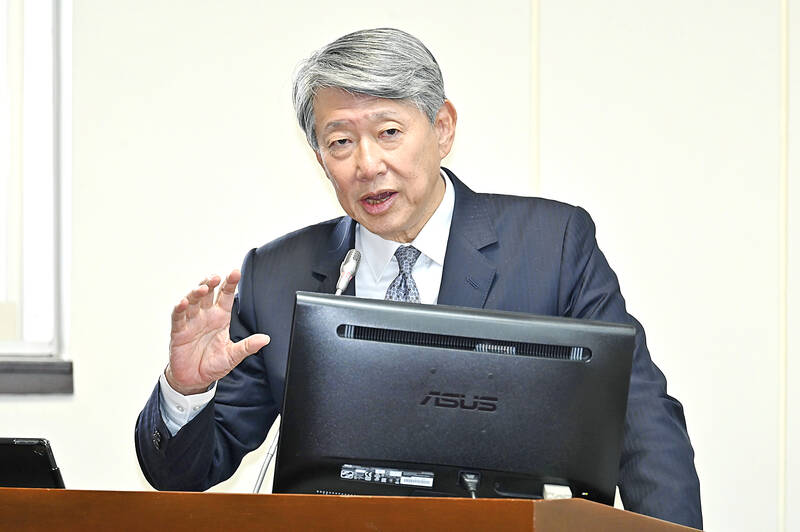Taiwan’s technology protection rules prohibits Taiwan Semiconductor Manufacturing Co (TSMC, 台積電) from producing 2-nanometer chips abroad, so the company must keep its most cutting-edge technology at home, Minister of Economic Affairs J.W. Kuo (郭智輝) said yesterday.
Kuo made the remarks in response to concerns that TSMC might be forced to produce advanced 2-nanometer chips at its fabs in Arizona ahead of schedule after former US president Donald Trump was re-elected as the next US president on Tuesday.
“Since Taiwan has related regulations to protect its own technologies, TSMC cannot produce 2-nanometer chips overseas currently,” Kuo said at a meeting of the legislature’s Economics Committee in Taipei.

Photo: Tu Chien-jung, Taipei Times
“Although TSMC plans to make 2-nanometer chips [abroad] in the future, its core technology will stay in Taiwan,” Kuo added.
LAW
Taiwanese law limits domestic chipmakers to producing chips abroad that are at least one generation less advanced than their fabs at home. TSMC told investors in July its next-generation A-16 chip is to enter volume production in the second half of 2026, after ramping up production of 2-nanometer chips next year.
According to TSMC’s overseas manufacturing roadmap, the company plans to produce 2-nanometer or more advanced chips in the US by the end of this decade, when its second fab in Arizona — which would utilize its 3-nanometer and 2-nanometer process technologies — becomes operational in 2028.
The third fab in Arizona would produce chips using 2-nanometer or even more advanced process technology, the chipmaker said.
TSMC’s first Arizona fab is set to ramp up production of 4-nanometer chips next month.
BILATERAL TIES
Meanwhile, Taiwan Semiconductor Industry Association (TSIA) chairman Cliff Hou (侯永清) yesterday said that history has shown that the result of the US presidential election would not significantly affect the company’s decades-long partnership between Taiwan and the US.
Hou also serves as a senior vice president at TSMC.
“The bilateral relationship has not changed because of the political landscape changes in the US,” Hou said at a forum in Hsinchu.
“There could be some alterations in details regarding this partnership. We will look at it when everything is certain,” Hou added.
Asked about how the TSIA could help local semiconductor companies navigate the challenges of the potential 10 percent tariff hikes that Trump threatened during his election campaign, Hou said the association has not received any official notification yet.
However, Taiwan should pour more resources into advancing chip technology and expanding its supply chain expertise to maintain global leadership, he said.
“We should accelerate research and development to ensure our standing as an indispensable member of the global semiconductor supply chain,” Hou said. “We are also working with the government to see whether we can attract foreign partners to set up design and materials centers in Taiwan.”
The 27-year TSMC veteran added that Taiwan must also aim to develop more expertise in equipment and materials, areas that are dominated by foreign businesses.
Additional reporting by Bloomberg

Intel Corp chief executive officer Lip-Bu Tan (陳立武) is expected to meet with Taiwanese suppliers next month in conjunction with the opening of the Computex Taipei trade show, supply chain sources said on Monday. The visit, the first for Tan to Taiwan since assuming his new post last month, would be aimed at enhancing Intel’s ties with suppliers in Taiwan as he attempts to help turn around the struggling US chipmaker, the sources said. Tan is to hold a banquet to celebrate Intel’s 40-year presence in Taiwan before Computex opens on May 20 and invite dozens of Taiwanese suppliers to exchange views

Application-specific integrated circuit designer Faraday Technology Corp (智原) yesterday said that although revenue this quarter would decline 30 percent from last quarter, it retained its full-year forecast of revenue growth of 100 percent. The company attributed the quarterly drop to a slowdown in customers’ production of chips using Faraday’s advanced packaging technology. The company is still confident about its revenue growth this year, given its strong “design-win” — or the projects it won to help customers design their chips, Faraday president Steve Wang (王國雍) told an online earnings conference. “The design-win this year is better than we expected. We believe we will win

Chizuko Kimura has become the first female sushi chef in the world to win a Michelin star, fulfilling a promise she made to her dying husband to continue his legacy. The 54-year-old Japanese chef regained the Michelin star her late husband, Shunei Kimura, won three years ago for their Sushi Shunei restaurant in Paris. For Shunei Kimura, the star was a dream come true. However, the joy was short-lived. He died from cancer just three months later in June 2022. He was 65. The following year, the restaurant in the heart of Montmartre lost its star rating. Chizuko Kimura insisted that the new star is still down

While China’s leaders use their economic and political might to fight US President Donald Trump’s trade war “to the end,” its army of social media soldiers are embarking on a more humorous campaign online. Trump’s tariff blitz has seen Washington and Beijing impose eye-watering duties on imports from the other, fanning a standoff between the economic superpowers that has sparked global recession fears and sent markets into a tailspin. Trump says his policy is a response to years of being “ripped off” by other countries and aims to bring manufacturing to the US, forcing companies to employ US workers. However, China’s online warriors